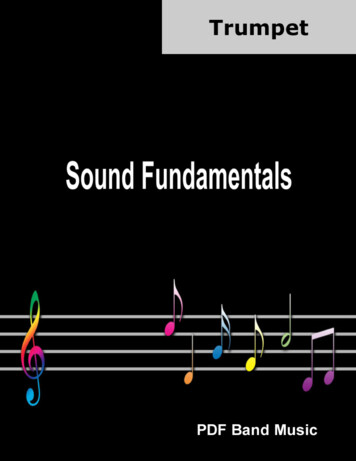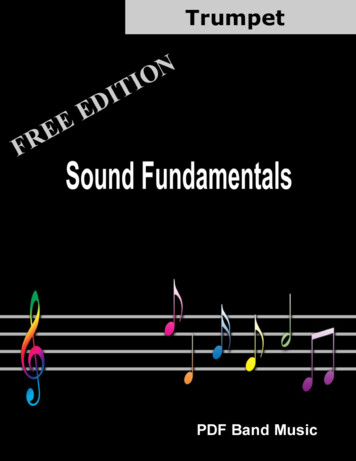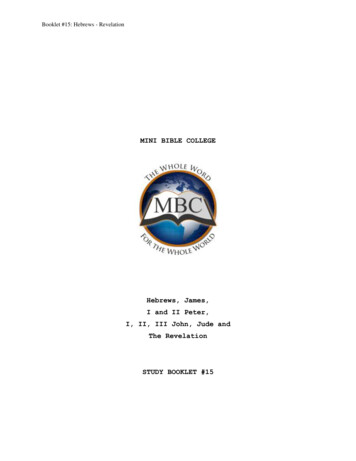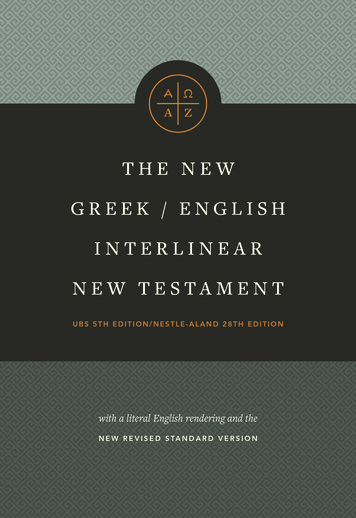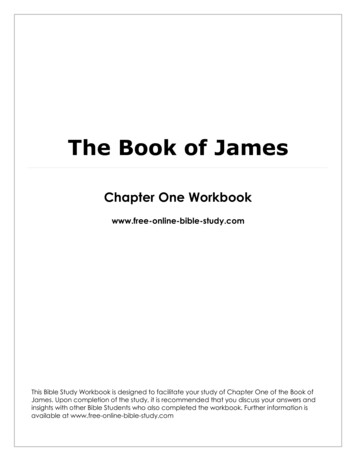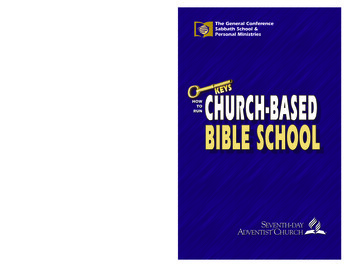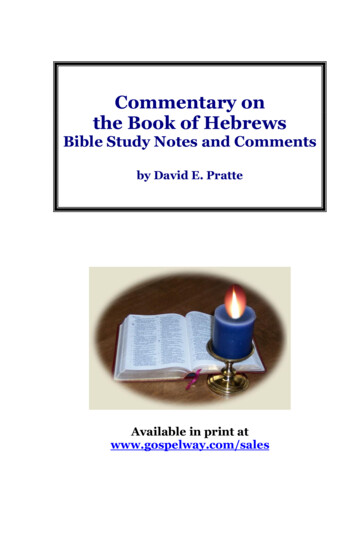
Transcription
Commentary onthe Book of HebrewsBible Study Notes and Commentsby David E. PratteAvailable in print atwww.gospelway.com/sales
Commentary on the Book of Hebrews:Bible Study Notes and Comments Copyright David E. Pratte, 2014Minor revisions 2016All rights reservedISBN-13: 978-1503359321ISBN-10: 1503359328Note carefully: No teaching in any of our materials isintended or should ever be construed to justify or to in anyway incite or encourage personal vengeance or physicalviolence against any person.Front Page PhotoModel of the ark of the covenant(public domain photo via Wikimedia Commons)“Then indeed, even the first covenant had ordinances of divine serviceand the earthly sanctuary. For a tabernacle was prepared which hadthe golden censer and the ark of the covenant overlaid on all sides withgold, in which were the golden pot that had the manna, Aaron's rodthat budded, and the tablets of the covenant; and above it were thecherubim of glory overshadowing the mercy seat. But Christ came asHigh Priest of the good things to come, with the greater and moreperfect tabernacle not made with hands, that is, not of this creation.” –Hebrews 9:1-11 (NKJV)Other AcknowledgementsUnless otherwise indicated, Scripture quotations are generally from theNew King James Version (NKJV), copyright 1982, 1988 by Thomas Nelson,Inc. used by permission. All rights reserved.Scripture quotations marked (NASB) are from Holy Bible, NewAmerican Standard La Habra, CA: The Lockman Foundation, 1995.Scripture quotations marked (ESV) are from The Holy Bible, EnglishStandard Version, copyright 2001 by Crossway Bibles, a publishingministry of Good News Publishers. Used by permission. All rights reserved.Scripture quotations marked (MLV) are from Modern Literal Versionof The New Testament, Copyright 1999 by G. Allen Walker.Scripture quotations marked (RSV) are from the Revised StandardVersion of the Bible, copyright 1952 by the Division of Christian Education,National Council of the Churches of Christ in the United States of America.Scripture quotations marked (NIV) are from the New InternationalVersion of the Holy Bible, copyright 1978 by Zondervan Bible publishers,Grand Rapids, Michigan.Study Notes on HebrewsPage #2
Other Books by the AuthorTopical Bible StudiesGrowing a Godly Marriage & Raising Godly ChildrenWhy Believe in God, Jesus, and the Bible? (evidences)The God of the Bible (study of the Father, Son, and Holy Spirit)Grace, Faith, and Obedience: The Gospel or Calvinism?Kingdom of Christ: Future Millennium or Present Spiritual Reign?Do Not Sin Against the Child: Abortion, Unborn Life, & the BibleTrue Words of God: Bible Inspiration and PreservationCommentaries on Bible BooksGenesisJoshua and RuthJudges1 Samuel2 Samuel1 KingsEzra, Nehemiah, and EstherJobProverbsEcclesiastesGospel of MatthewGospel of MarkGospel of JohnActsRomansGalatiansEphesiansPhilippians and ColossiansHebrewsJames and Jude1 and 2 Peter1,2,3 JohnBible Question Class BooksGenesisJoshua and RuthJudges1 Samuel2 Samuel1 KingsEzra, Nehemiah, and EstherJobProverbsEcclesiastesIsaiahDanielHosea and JoelGospel of MatthewGospel of MarkGospel of LukeGospel of JohnActsRomans1 Corinthians2 Corinthians and GalatiansEphesians and PhilippiansColossians, 1&2 Thessalonians1 & 2 Timothy, Titus, PhilemonHebrewsGeneral Epistles (James – Jude)RevelationWorkbooks with Study NotesJesus Is Lord: Workbook on the Fundamentals of the Gospel of ChristFollowing Jesus: Workbook on DiscipleshipGod’s Eternal Purpose in Christ: Workbook on the Theme of the BibleFamily Reading BooklistVisit our website at www.gospelway.com/sales to see a currentlist of books in print.Page #3Study Notes on Hebrews
Other Resources from the AuthorPrinted books, booklets, and tracts available atwww.gospelway.com/salesFree Bible study articles online atwww.gospelway.comFree Bible courses online atwww.biblestudylessons.comFree class books atwww.biblestudylessons.com/classbooksFree commentaries on Bible books atwww.biblestudylessons.com/commentaryContact the author atwww.gospelway.com/commentsStudy Notes on HebrewsPage #4
Table of ContentsIntroduction to Hebrews . 7Hebrews 1 . 14Hebrews 2 .25Hebrews 3 .35Hebrews 4 . 44Hebrews 5 . 55Hebrews 6 . 61Hebrews 7 . 69Hebrews 8 . 83Hebrews 9 . 91Hebrews 10 . 104Hebrews 11 . 122Hebrews 12 . 143Hebrews 13 . 156(Due to printer reformatting, the above numbers may be off a page or two.)Notes to the ReaderTo save space and for other reasons, I have chosen not to includethe Bible text in these notes (please use your Bible to follow along). WhenI do quote a Scripture, I generally quote the New King James Version,unless otherwise indicated. Often – especially when I do not usequotations marks – I am not quoting any translation but simplyparaphrasing the passage in my own words. Also, when I ask the readerto refer to a map, please consult the maps at the back of your Bible or ina Bible dictionary.You can find study questions to accompany these notes atwww.gospelway.com/salesTo join our mailing list to be informed of new books orspecial sales, contact the author atwww.gospelway.com/commentsPage #5Study Notes on Hebrews
Introductory Thoughts aboutCommentariesOnly the Scriptures provide an infallible, authoritatively inspiredrevelation of God’s will for man (2 Timothy 3:16,17). It follows that thiscommentary, like all commentaries, was written by an uninspired,fallible human. It is the author’s effort to share his insights about God’sword for the purpose of instructing and edifying others in the knowledgeand wisdom found in Scripture. It is simply another form of teaching,like public preaching, Bible class teaching, etc., except in written form(like tracts, Bible class literature, etc.). Nehemiah 8:8; Ephesians4:15,16; Romans 15:14; 1 Thessalonians 5:11; Hebrews 3:12-14; 5:12-14;10:23-25; Romans 10:17; Mark 16:15,16; Acts 8:4; 2 Timothy 2:2,24-26;4:2-4; 1 Peter 3:15.It follows that the student must read any commentary withdiscernment, realizing that any fallible teacher may err, whether he isteaching orally or in writing. So, the student must compare all spiritualteaching to the truth of God’s word (Acts 17:11). It may be wise to readseveral commentaries to consider alternative views on difficult points.But it is especially important to consider the reasons or evidence eachauthor gives for his views, then compare them to the Bible.For these reasons, the author urges the reader to alwaysconsider my comments in light of Scripture. Accept what Isay only if you find that it harmonizes with God’s word. Andplease do not cite my writings as authority, as though peopleshould accept anything I say as authoritative. Always let theBible be your authority.“He who glories, let him glory in the Lord”– 1 Corinthians 1:31Study Notes on HebrewsPage #6
Abbreviations Used in These NotesASV – American Standard Versionb/c/v – book, chapter, and verseESV – English Standard Versionf – the following verseff – the following versesKJV – King James VersionNASB – New American Standard BibleNEB – New English BibleNIV – New International VersionNKJV – New King James VersionRSV – Revised Standard VersionPage #7Study Notes on Hebrews
Introduction to HebrewsFacts about HebrewsThemeHebrews describes the advantages of the gospel over the OldTestament, written to admonish Christians of Jewish (Hebrew)background not to fall away from the gospel and return to Judaism.The recipientsThe book was evidently written to Christians. The author urgesthem to go onward from the basic principles of the gospel, becomemature, and learn even to be teachers (5:12-6:2). Numerous passagesurge them to hold on to the truth and not depart from it. Further, theywere Hebrew or Jewish in background as shown by the numerousreferences to Old Testament characters and practices. Such emphasiswould mean little to Gentiles, but would be familiar and important tothose of Jewish background.It is not clear where these Hebrew Christians were located. Thereference in 2:3 indicates that they had heard the gospel fromeyewitnesses of Jesus, which would indicate they lived in Palestine. But12:4 indicates they were not martyrs, which would mean they were notprimarily in Jerusalem. Other theories exist. The question cannot beanswered conclusively and so must not be of great importance. (Kingand Horne include substantial discussions in their introduction for thosewho wish to pursue the question further.)Apparently these Christians had been converted from Judaism butwere now facing temptation to return to their former beliefs. It appearsthat they were being persecuted for their present faith. This is evidentfrom the numerous references throughout the book urging them to holdfast the message of the gospel and not depart from it. To motivate themto continue in the gospel, the author gives an extended comparisonbetween the Old Testament and the New Testament, showing theadvantages of the new over the old.The term “Hebrew” was used for Abraham in Genesis 14:13.Because of God’s promises to Abraham, his descendants pridedStudy Notes on HebrewsPage #8
themselves in being Hebrews. Paul referred to his life before conversionas a “Hebrew of Hebrews” (Philippians 3:5).Even when people have been richly blessed, it is easy for them toforget the problems of the past, look at their current problems, and wishthey could go back to previous circumstances. The Israelites in thewilderness forgot the hardships of the past and wanted to go back toEgypt. Lot’s wife overlooked the evils of Sodom and wanted to return.Gentile converts to the gospel sometimes wanted to return even to theirpast idolatry (Galatians 4:9). So these Hebrew converts were tempted tooverlook the failures of the Old Testament, remembered the pride ofbeing a Jew, over-emphasized the persecutions and hardships of thegospel, and were drawn to go back to their previous life. (See Welch’sintroduction.)AuthorIt is uncertain who the author of Hebrews is. There is no authornamed in the book. Some have suggested it was written by Paul orApollos or Silas, etc. The most common view of ancient writers was thatPaul wrote it. Several phrases in the book are typical of Paul.Horne states: “the Christian church generally [attributed the book]to Saint Paul.”The evidence that Paul is the author is not conclusive, however, butneither is the evidence for any other specific individual. This questionhas been discussed for generations without successful resolution. Isurely cannot resolve it. Since the answer to the question is not essentialto anyone’s salvation, I am not inclined to pursue it further. (King has acareful analysis in his introduction for those who want furtherdiscussion. Horne defends at length the view that Paul was the inspiredauthor. See also Milligan, pp. 5ff.)The book was written from Italy – 13:24.Inspiration and dateWhat is important is that the book was generally accepted as beinginspired from very ancient times, and was included in some of the oldestlists of inspired New Testament books. There is no serious doubt that itshould be included as inspired Scripture.It was probably written before the fall of Jerusalem. The book refersto the temple, priesthood, and animal sacrifices as being practiced whenit was written (Hebrews 8:4; 10:11; etc.). This would not have been trueafter the destruction of the temple in AD 70. King points out that, hadthe temple with its priesthood and sacrifices already been destroyedwhen the book was written, the author would almost surely have usedthis as evidence that the Old Covenant was ended. The fact he nevermentions these events is evidence the book was written before thetemple fell.A date somewhere around AD 66 or 67 is a reasonable conclusion.Page #9Study Notes on Hebrews
Summaries of the ContentsOutline of the BookI. The Superiority of Jesus (1:1-4:13)A. The Deity of Jesus (1:1-2:4)1. Jesus as the manifestation of God (1:1-3)2. Jesus’ superiority to angels (1:4-14)3. Application to faithfulness (2:1-4)B. The humanity of Jesus (2:5-18)1. The position of humans (2:5-8)2. The position Jesus took as a human (2:9-13)3. The blessings humans receive as a result (2:14-18)C. Jesus’ superiority over Moses (3:1-6)D. Applications to faithfulness (3:7-4:13)1. Unfaithfulness of Israel (3:7-11)2. Warning to Christians (3:12-15)3. Further description of Israel’s unfaithfulness (3:16-4:7)4. Further admonitions to Christians (4:8-13)II. The Superiority of Jesus’ Priesthood (4:14-8:6)A. Duties/qualifications of our High Priest (4:14-5:11)1. Understanding man’s need (4:14-16)2. Offering sacrifices (5:1-3)3. Divine appointment (5:4-6)4. Author of salvation (5:7-11)B. Applications to growth & falling away (5:12-6:12)1. Some who failed to grow (5:12-14)2. The need for growth (6:1-3)3. The danger of falling away (6:4-8)4. The need for diligence, not laziness (6:9-12)C. Jesus’ priesthood compared to Melchizedek’s (6:13-8:6)1. Promise to Abraham confirmed by an oath (6:13-20)2. Melchizedek’s greatness (7:1-10)3. Change of priesthood and change of law (7:11-19)4. Greatness of our High Priest (7:20-28)5. A more excellent ministry in the true tabernacle (8:1-6)III. The Superiority of the New Covenant (8:7-10:18)A. Old Covenant to be replaced by the new (8:7-13)B. Description of the Old Testament tabernacle (9:1-10)1. Articles of the tabernacle (9:1-5)2. Sacrifices and rituals in the tabernacle (9:6-10)B. Jesus’ sacrifice compared to animal sacrifices (9:11-10:18)1. Jesus’ blood as the New Testament sacrifice (9:11-15)2. The need for shedding blood (9:16-23)Study Notes on HebrewsPage #10
3. The better sacrifice offered only once (9:24-28)4. The inadequacy of animal sacrifices (10:1-4)5. Jesus’ sacrifice superior to animal sacrifices (10:5-10)6. Jesus’ sacrifice the satisfaction of our need (10:11-18)IV. Applications to Faithfulness (10:19-13:25)A. Drawing near to God, not turning from Him (10:19-39).1. Holding fast and assembling with the saints (10:19-25)2. Avoiding willful sin (10:26-31)3. Remembering past sacrifices and suffering (10:32-39)B. Old Testament examples of faithfulness (chapter 11)C. Things that encourage faithfulness (chapter 12)1. The example of Jesus (12:1-4)2. The value of discipline (12:5-11)3. Strengthening one another (12:12-17)4. A contrast of two mountains (12:18-29)D. Specific requirements of faithfulness (chapter 13)Advantages of the New Testament over the Old TestamentHebrews lists the following advantages of the New Testament overthe Old:1:1-2:5 – The Old Testament was revealed by angels throughprophets. The gospel was revealed by Jesus (through apostles). Jesus issuperior to angels.3:1-6 – Moses, the giver of the Old Testament, was a servant in thehousehold. Jesus, giver of New Testament, was worthy of more glory andwas a Son over the house.7:1-9 – Jesus is a priest after the order of Melchizedek, who wasgreater than Abraham/Levi.7:19 – The gospel gives a better hope.7:20 – Jesus is a priest according to God’s oath (unlike OldTestament priests).7:22 – The New Testament is a better covenant.7:23-25 – Old Testament priests died, but Jesus remains a priestforever.7:25 – Jesus can save to the uttermost (where under the OldTestament sins were remembered).7:26-28 – Jesus committed no sins; Old Testament priests hadweaknesses.8:1-4 – Jesus is a priest on God’s right hand, not on earth (like OldTestament priests).8:2 – Jesus ministers in the true tabernacle pitched by God, notmen. Old Testament priests served in the earthly tabernacle pitched bymen.8:6 – The gospel has better promises, a better covenant, and moreexcellent ministry.Page #11Study Notes on Hebrews
8:10,11 – The New Testament was on the heart & mind (not onstone). One must know the Lord to enter the covenant (not born into it).8:12 – Sins are remembered no more under the gospel.9:11 – Jesus a High Priest of the greater, more perfect tabernacle.9:12-14 – Jesus’ blood obtains eternal redemption and purgesconscience from dead works (which Old Testament sacrifices could notdo).9:23-28 – Jesus offered a better sacrifice, went to heaven, offeringHimself once (unlike Old Testament sacrifices that had to be repeated).10:1-18 – We are sanctified by the offering of Jesus once for all, sosins are remembered no more (unlike Old Testament sacrifices, wheresins were remembered yearly).12:18-24 – We have not come to Mt. Sinai, with its fear andtrembling. We have come to Mt. Zion (gospel), with the church, etc.,including Jesus the Mediator of the New Testament, whose blood speaksbetter than Abel’s.12:25-29 – God removed the Old Testament (shaking heaven andearth), giving us a new arrangement with a kingdom that cannot beshaken.Exhortations to Remain Faithful and Not FallHebrews 2:1-3 – Give heed not to drift. People were strictlypunished under the Old Testament, so we surely will be if we neglectNew Testament salvation.3:6-19 – To partake of Christ we must hold fast our confidence andnot fall away from God as Israel did (verses 6,12-14).4:1-11 – Fear lest we fall short of God’s promised rest. Give diligenceto enter and not fall like the Jews did (note verses 1,11).4:14-16 – Hold fast because Jesus is our High Priest who can givegrace and mercy.6:4-12 – Do not fall away (verses 4-8), but be diligent to the end(verse 11), imitating those who inherit the promises (verse 12).10:19-25 – Have boldness to draw near in full assurance of faith andhold our confession without wavering.10:26-31 – If we sin willfully, there is no sacrifice, but onlyexpectation of judgment.10:35-39 – Do not cast away our confidence with its great reward,but endure and do not draw back to perdition. Rather, have faith to thesaving of the soul.12:1-4 – Faithful servants of the Old Testament and Jesus Himselfshow by example that we should run with patience and not grow weary.12:5-11 – The Lord chastises us for our profit, so do not bediscouraged when rebuked.12:12-17 – Look diligently lest any fall away and many be defiled.Strengthen the weak and do not imitate the profanity of Esau.Study Notes on HebrewsPage #12
12:25-28 – Do not refuse Him who speaks, for how shall we escape?Serve acceptably with fear.13:9-13 – Do not be carried away by strange doctrines, but be willingto bear Jesus’ reproach.13:22 – Bear the word of exhortationThings To Do To Stay Faithful1. Give earnest heed to the things that have been taught, hold fast,and be steadfast – 2:1-3; 3:14; 4:11.2. Realize that sin will lead to punishment – 2:2,3; 3:7-19; 4:1-11.3. Consider the example of others who fell – 3:7-12; 4:1-11.4. Exhort one another daily – 3:13.5. Appreciate the grace of Jesus and His supreme ability as HighPriest – 4:14-5:9.6. Study God's word and exercise the sense of right and wrong so asto discern good from evil and go on to perfection – 5:11-6:3.7. Be diligent, not lazy, imitating those who inherit the promises –6:11,12.8. Stir one another up to love and good works, not forsaking ourassembling together, but exhorting one another – 10:24,25.9. Remember the rewards and punishments for our conduct –10:26-39.10. Remember the sacrifices you and others have made for the truth– 10:32-34.11. Consider Jesus and Old Testament witnesses so that we do notbecome weary – 12:1-4.12. Appreciate how suffering and chastisement can benefit us –12:6-11.13. Strengthen one another and watch diligently for any who fallshort – 12:12 – 17.14. Imitate those who rule and teach, submitting to them – 13:7,17.15. Be willing to suffer and sacrifice for Jesus to suffer for us – 13:1016.16. Bear the word of exhortation – 13:22.Page #13Study Notes on Hebrews
I. The Superiority ofJesus – 1:1-4:13Hebrews 11:1-2:4 – The Deity of Jesus1:1-3 – Jesus as the Manifestation of God1:1,2 – God spoke in times past by the prophets, but has nowspoken through His Son, heir of all things, through whomHe made the worlds.The author offers no introductory greeting of any kind, but launchesimmediately into his theme. He begins comparing the Old Testament tothe New Testament by contrasting how God spoke to man under the twosystems. One major advantage of the New Testament is the spokesmanused by God to reveal His will.Old Testament prophetsIn times past (the Old Testament) God spoke to the fathers bymeans of prophets, in various ways and at various times. The “fathers”refers to the ancestors of the Hebrews. This term is often so used. SeeLuke 1:55,72; John 7:22; Acts 13:32; etc.A “prophet” was a spokesman who was directly guided to speak forGod. Prophets possessed the gift of direct revelation so that they couldspeak forth directly God’s will without needing to be taught through anyother man. See 2 Peter 1:20,21; Acts 2:30; 3:21; Luke 1:70; Romans 1:2;2 Kings 20:11,16; etc.God’s will for men prior to the gospel was not revealed all at once orby any one means. Various prophets received revelations on variousStudy Notes on HebrewsPage #14
subjects at different times. Some of the methods God used includeddreams, messages from angels, direct guidance of spokesman, etc.(Numbers 12:6,8; Genesis 37:5-8; 1 Samuel 3:1ff; Judges 6:11ff).Jesus as God’s New Testament spokesmanIn contrast to the Old Testament, God has spoken in these last daysby His Son. Jesus is, of course, God’s Son, often so described in the NewTestament. See Luke 1:35; John 3:16; Acts 13:33; 8:37; Revelation 1:5;Romans 1:4; etc. That Jesus acted as God’s spokesman is specificallystated in many places: see 2:3; such as Matthew 17:5; Acts 3:22,23; John3:34; 8:28; 1:18; 12:49.The “last days,” as used in this context, refers to the period of timein which the message of Jesus in the gospel prevails – compare Acts2:16f; Isaiah 2:2-4; 1 Peter 1:20. Some believe this expression refers tothe period of time immediately before Jesus’ second coming, yet such aview cannot possibly fit this passage. The author here describes Jesus ashaving already spoken in “the last days.” Others view the expression asreferring to last days of the Old Testament age. But the context and otherreferences seem to include the whole gospel age: the age in which God’slast will for man is revealed through Jesus Christ, in contrast to the OldTestament age when God spoke through prophets. See other uses of theexpression in Genesis 49:1; Numbers 24:14; Deuteronomy 4:30;Jeremiah 23:20; Micah 4:1; Hosea 3:5; Daniel 10:14.The following verses of Hebrews 1 all show the great superiority ofJesus, not just over people, but even over angels. One great blessing wehave in the gospel is that our great spokesman and lawgiver is JesusChrist.The advantage of Jesus as a spokesman for God was that He was notan ordinary man (though chapter 2 will show that He did come to earthin the form of a man). He was in fact God in the flesh (John 1:18). WhenGod spoke through prophets, He was speaking through the agency of amere man. But when Jesus spoke, this was God Himself speaking toman.Heir of all things, through whom the worlds were madeBy Him all things were made (compare verse 10; John 1:1-3;Colossians 1:16f). He is therefore eternal, not having been createdHimself, but being the eternal Creator of all. Some folks claim that Jesusis a created being, the first thing the Father created, then Jesus createdeverything else. This is claimed by those who deny the Deity of Jesus,denying specifically His eternal existence. However, this passage andthose above show clearly that Jesus made everything that was made. So,He Himself is not made but is eternal.Further, all things are His by right of being the Creator, and by rightof His relationship as Son to the Father. So, He is the heir of all things.As the Son, He possesses all that the Father possesses (see John 17:10).Page #15Study Notes on Hebrews
Hebrew people claimed to possess great respect for messages givenby prophets. They ought therefore to have even more respect for thegospel, for it was spoken by one greater than any mere human prophet(Matthew 16:15-17; 17:1ff). Rather than leaving the gospel to the returnto the Old Testament, they ought to cling to the gospel as the fulfillmentof that which their respected prophets pointed forward to.1:3 – Jesus was the brightness of God’s glory, the expressimage of His person, upholding all things by His word,purged our sins, and sat down at God’s right hand.Jesus was the brightness of God’s glory.He revealed the glory of God by His conduct, by His mightymiracles, by such amazing displays as the Transfiguration, etc. (John1:18; 14:9). Specifically, at the Transfiguration, the same point was madeas here in this context, that Jesus is the spokesman for God, greater thanthe Old Testament prophets (Moses and Elijah). Where people listenedto the prophets formerly, now they should listen to Jesus because He isthe Son of God. See Matthew 17:1-5.Jesus was the express image of God’s person.He was not just made “in the image of God” as all men are, havingsome of God’s characteristics, but He was the express image of Hisperson. He was identical in nature, for He was in fact God in the flesh.To know what He is like is to know what the Father is like. See John 1:18;14:9.This plain statement shows that Jesus was divine Himself. Otherpassages teach that He possessed all characteristics of Deity and wastherefore God (compare verse 8; John 1:1; 20:28; Colossians 2:9;Philippians 2:5-8; 1 Timothy 3:16). This conclusion also follows from thecharacteristics this context says Jesus possesses. How could He possessall these unique characteristics of God and not be God?This does not mean He was the Father. The Father and the Son mustbe two separate beings, but both possess Deity, as does the Holy Spirit.So, the God we worship consists of three separate and distinct DivineBeings: the Father, Son, and Holy Spirit.Jesus not only created all things, but by His power all thingscontinue to exist. This refers to the power of God to sustain that whichHe created. Jesus brought all things into existence, but they continue toexist because He so wills it. (See Nehemiah 9:6; Colossians 1:17; Acts17:28.)He also offered the sacrifice by which our sins can be forgiven. Thiswill be discussed at length as the book proceeds. We should appreciatehere the amazing fact that the very One who created mankind alsooffered Himself as the sacrifice to save mankind from his sins. TheCreator took on Himself the form of the creature whom He had madeStudy Notes on HebrewsPage #16
and who had failed to serve him faithfully, then He gave His life to savethe fallen creature!“Express image” ( ) “denotes, firstly, ‘a tool forgraving’ then, ‘a stamp’ or ‘impress,’ as on a coin or a seal, inwhich case the seal or die which makes an impression bears the‘image’ produced by it, and, vice versa, all the features of the‘image’ correspond respectively with those of the instrumentproducing it. It is the fact of complete similarity which this wordstresses ” – Vine.Sat down at the right hand of the majesty on highAfter making the sacrifice for our sins, He sat down on the righthand of majesty on high. It was on the right hand of God that He was toreign as king – (compare verse 13; Psalms 110:1,2). This term refers to aposition of great authority and honor (1 Kings 2:19; Psalm 80:17;Matthew 20:20-23; 26:64). Jesus has been in this position since the timeHe died and arose from the dead (Acts 2:30-36; 7:56; Mark 16:19;Hebrews 8:1; 10:12; 12:2; Colossians 3:1; Romans 8:34; Ephesians 1:2022; 1 Peter 3:22). We will see numerous references to His position onGod’s right hand throughout Hebrews.Psalm 110:1,2 shows the Messiah reigning at God’s right hand andbeing a priest after the order of Melchizedek – i.e., both king and priestat the same time. Since Jesus now has this position, then He must nowbe King over His kingdom. He received this position as a result of Hisresurrection. Therefore, His kingdom now exists. He will not becomeking and establish His kingdom at His second coming, as premillennialfolks suppose. We will discuss this at great length as this book unfolds.Further, the fact that Jesus sat down indicates that His work onearth was complete. A person sits down after their work is done. So thefact Jesus sat down at God’s right hand when He ascended to heaven,not only indicates He has a place of great honor and authority, but it alsoindicates that the work He came to earth to do has now beenaccomplished.Note how the author, in attempting to show the importance of theNew Testament and the value of remaining true to its teaching, beginsby emphasizing the exalted position of Jesus. Jesus is the foundation ofthe gospel and everything related to it (1 Corinthians 3:11). If He is notimportant, then nothing about the gospel is important. But if He isimportant, then everything about the gospel is important because it isthe revelation of God’s will, which He spoke to us (verses 1,2).When we seek to convince people of their need to follow the gospeland not fall away, we too need to emphasize the importance of Jesus andwho He really is.Page #17Study Notes on Hebrews
1:4-14 – Jesus’ Superiority to Angels1:4-6 – Unlike angels, Jesus is the Son of God, so angelsshould worship Him.In verse 4 the writer begins a lengthy discussion showing thesuperiority of Jesus over angels. This will be applied in 2:2 to show that,as a spokesman and lawgiver, Jesus is superior even to the angels bywhom various Old Testament revelations were given.That Jesus is greater than angels is also stated or implied inEphesians 1:21
Free Bible study articles online at www.gospelway.com Free Bible courses online at www.biblestudylessons.com Free class books at . were Hebrew or Jewish in background as shown by the numerous references to Old Testament characters and practices. Such emphasis would mean littl
